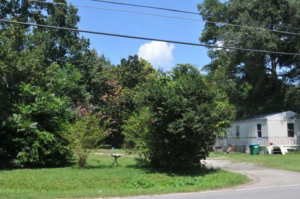- By David Slade dslade@postandcourier.com
- Oct 2, 2022
Delinquent tax sales, like this one in Charleston County in 2014, tend to attract lots of bidders. Bidders can end up owning the properties, or they can collect large interest payments if the previous owners reclaim them. File/Brad Nettles/Staff
SUMMERVILLE — The property Wendy Reed’s great-grandmother inherited in 1957 near downtown Summerville was sold in 2012 to pay a $112 delinquent property tax bill, and after years of fighting Dorchester County in court over it, Reed has conceded defeat.
A lawsuit that framed the sale as a civil rights issue ended this summer when the S.C. Court of Appeals upheld an earlier ruling in the county’s favor.
Former state lawmaker Thomas Limehouse, who bought Reed’s eighth-of-an-acre family property for $2,000 at a delinquent tax auction, was also a defendant.
Reed said she hopes to buy the property back from Limehouse, who said he’s been negotiating with the family.

The West Richardson Avenue property in Summerville at the heart of an 8-year lawsuit over how Dorchester County handles heirs’ properties in delinquent tax sales. The lawsuit was filed in 2014, the year this photo was taken. File/Leslie Cantu/Journal Scene
Reed’s lawyer Nancy Bloodgood had argued Reed should have been able to buy back the property before the county transferred it to Limehouse in 2014, but that she faced discrimination as a Black heirs’ property owner.
Bloodgood said Dorchester County refused to let Reed reclaim the tax-delinquent property because her name wasn’t on the deed. Heirs’ properties are those that have been handed down through families without the benefit of written wills or probate court, leaving them with tangled titles.
Reed’s case illustrates how delinquent tax sales are a particular challenge facing heirs’ property owners. People who lose a property through a delinquent tax sale have a year to reclaim it by paying back taxes, fees and interest, but those with heirs’ property face the challenge of proving it was their property to reclaim.
“I never understood the problem with living on heirs’ property,” said Reed, who raised a son and daughter in her manufactured home on West Richardson Avenue. She continued living there with her husband and three grandchildren while the court case played out.
“I never knew it was so easy to lose property like that,” Reed said.
As one heir of the deceased former owners of the land, Reed owned 1/75th of the property, but none of that was legally recorded. It’s not an uncommon situation in South Carolina, particularly in Black communities.

